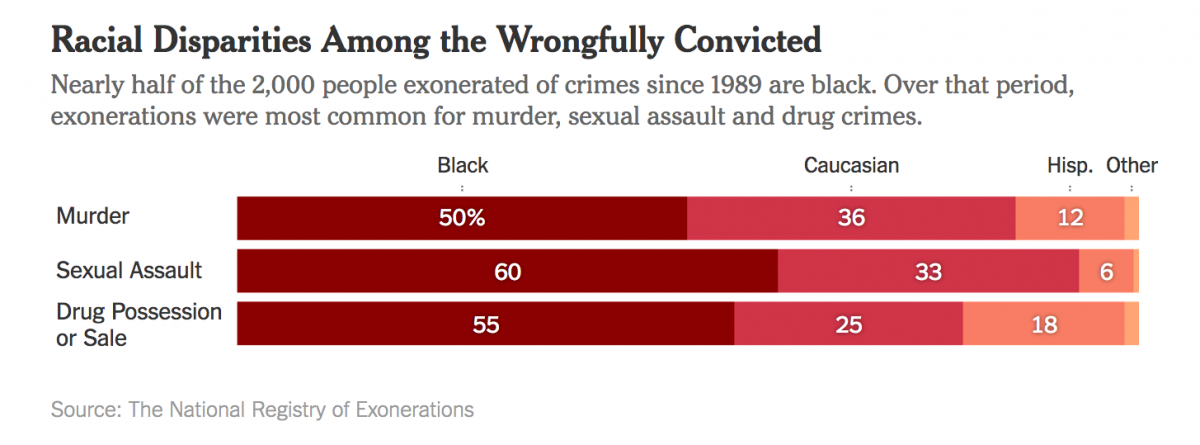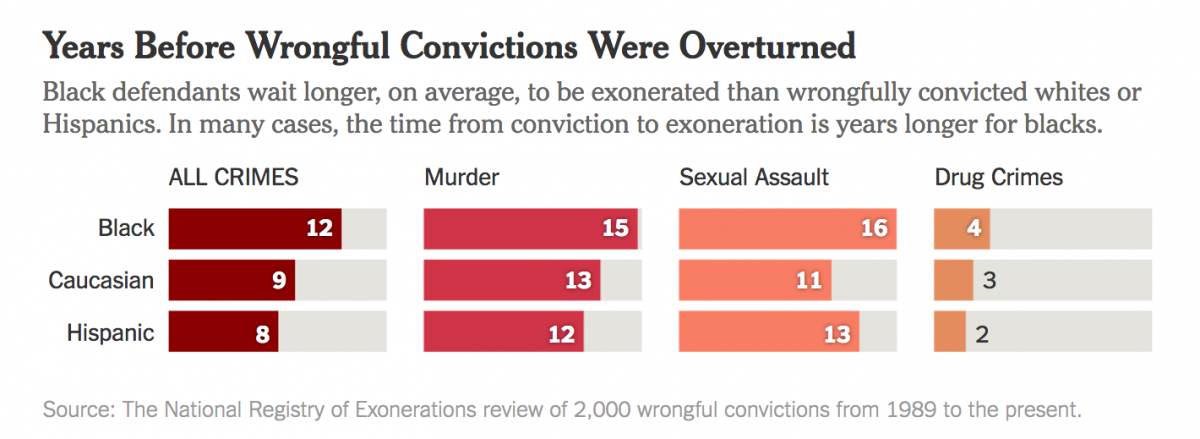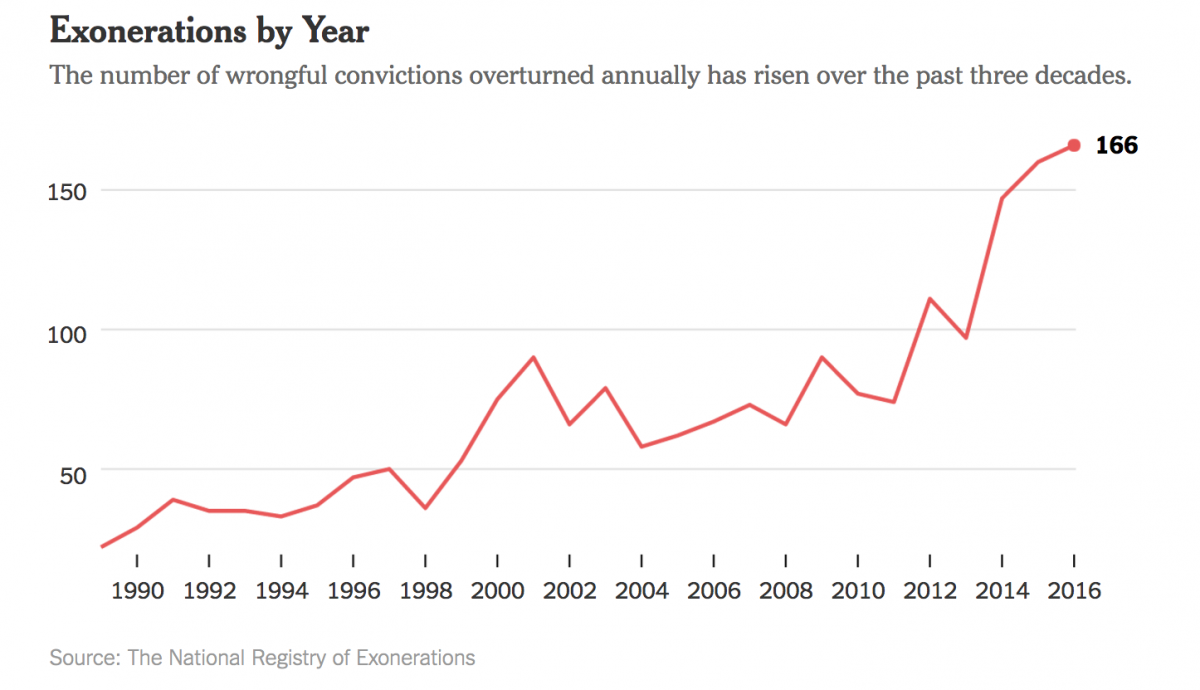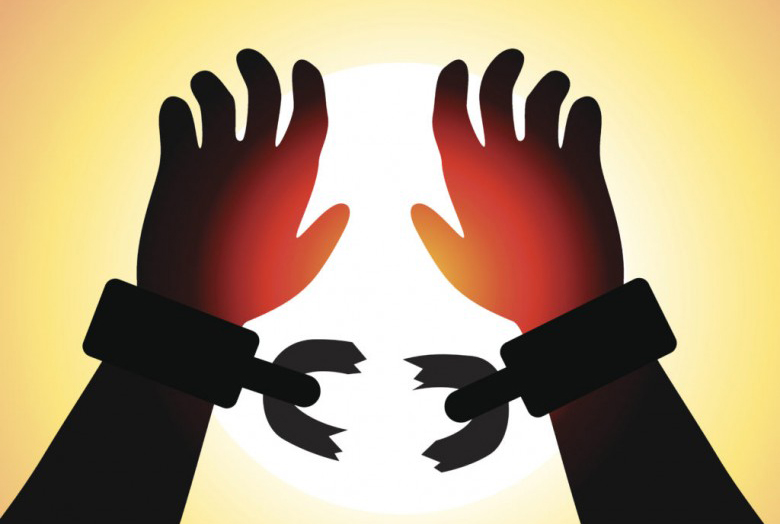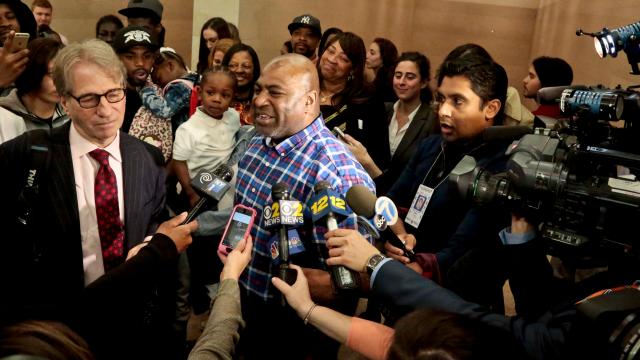
Andre Hatchett, center, next to his lawyer Barry Scheck at a news conference in 2016 after his exoneration in Brooklyn for the killing of Neda Mae Carter. Credit Bebeto Matthews/Associated Press
Black people convicted of murder or sexual assault are significantly more likely than their white counterparts to be later found innocent of the crimes, according to a review of nearly 2,000 exonerations nationwide over almost three decades.
Innocent blacks also had to wait disproportionately longer for their names to be cleared than innocent whites, the review, released last Tuesday by the National Registry of Exonerations, found. Blacks wrongfully convicted of murder, for example, spent an average of three more years in prison before being released than whites who were cleared.
“It’s no surprise that in this area, as in almost any other that has to do with criminal justice in the United States, race is the big factor,” said Samuel R. Gross, a University of Michigan law professor and a senior editor of the registry, a project of the law school that aims to provide data on false convictions to prevent them in the future.
The analysis focuses on the three types of crimes for which exonerations are most common: murders, sexual assaults and drug-related offenses. It is based on 1,900 wrongful convictions from 1989 to mid-October of last year, about 47 percent of which involved exonerated black defendants. Because of limited data for other groups, the authors compared only black and white populations in detail.
While the Tuesday report confirms what previous studies have found — that blacks make up a disproportionate share of the wrongfully convicted — it also uses the registry’s ever-growing collection of data to explore potential factors driving that disparity.
“The causes we have identified run from inevitable consequences of patterns in crime and punishment to deliberate acts of racism,” write Mr. Gross and his fellow authors, Maurice Possley, a senior researcher, and Klara Stephens, a research fellow.
When it comes to murder, black defendants account for 40 percent of those convicted of the crime, but 50 percent of those wrongfully convicted, they found. Whites accounted for 36 percent of wrongfully convicted murder defendants.
A high murder rate within the black community contributes to the high number of wrongfully convicted black murder defendants, but it alone does not explain the disparity, the authors write.
Racial bias may play a role. Only about 15 percent of all murders committed by black people involve white victims, yet 31 percent of blacks eventually cleared of murder convictions were initially convicted of killing white people, they found.
Misconduct, such as hiding evidence, tampering with witnesses or perjury, may also have contributed to the racial disparity.
The authors found such wrongdoing was present in 76 percent of cases in which black murder defendants were wrongfully convicted, but just 63 percent of cases in which white defendants were exonerated.
The report’s authors found similar patterns for sexual assault, with 59 percent of all exonerations going to black defendants, compared with 34 percent for white defendants.
Again, the authors concluded that racial bias may contribute to the disparity. Previous research has found that white Americans are more likely to misidentify black people for one another than white people, a phenomenon they said may play a role in eyewitness misidentification.
The registry found eyewitness errors in 79 percent of sexual assault cases involving wrongfully convicted black defendants, compared with 51 percent in cases with exonerated white defendants.
In a separate report released on Tuesday, the registry said it counted at least 166 exonerations last year in the United States, a record. Of those, 54 defendants were wrongfully convicted of homicides, 24 of sexual assaults and 15 of other violent crimes. At least 70 of the exonerations involved official misconduct.
The registry data is based on a variety of sources, including nonprofit organizations that fight for the wrongfully convicted, reviews conducted by prosecutors’ offices and studies conducted by the registry’s researchers. Still, Mr. Gross said, there may be many that the group has missed.
“There are probably more exonerations that we don’t know about than there are that we do know about,” he said.
3 WAYS TO SHOW YOUR SUPPORT
- Log in to post comments

